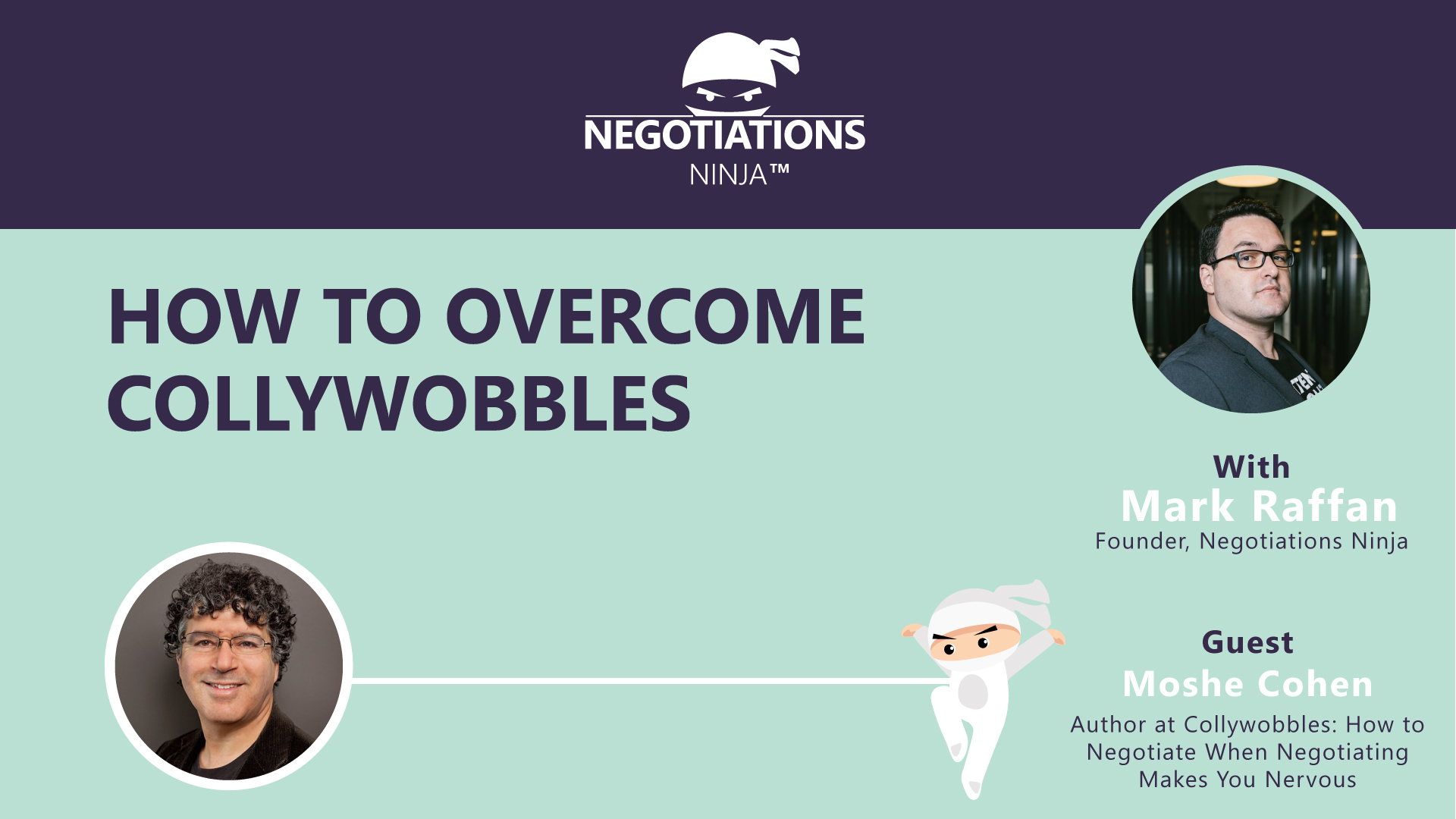Humans are primarily emotional. We bring fears into our negotiations. If we push too hard, we might get nothing. If we antagonize the other party, they might retaliate. We also worry about damaging relationships. The whole negotiation process is emotional. And when you get emotional, your ability to do what you know you should do decreases.
Two years ago, Moshe Cohen published “Collywobbles: How to Negotiate When Negotiating Makes You Nervous.” The term “Collywobbles” means the kind of stomachache you get when doing something that makes you anxious. His book looks to address an issue people are taught how to do, but when they have to do it, they choke. Something happens between theory and execution. Usually, they get nervous or anxious.
So what do you do when you feel like your emotions are taking over? Moshe shares some strategies in this episode of Negotiations Ninja.
Outline of This Episode
- [1:43] Learn more about Moshe Cohen
- [3:24] Why most people get collywobbles
- [4:25] Where does fear stem from?
- [5:49] Competitive and cooperative negotiation styles
- [7:06] The pitfalls that impact negotiations
- [9:00] Stop your false perceptions in their tracks
- [13:37] Why managing moments is critical
- [16:45] Physical health is often overlooked
- [18:23] Pay attention to physical signals
- [20:45] What Moshe learned from his background
Where does fear stem from?
Negotiators have a dichotomy between outcome and relationship. We think that to achieve good outcomes, we have to sacrifice or risk the relationship. And we think to have good relationships, we have to accommodate their needs and, therefore, sacrifice outcomes to get that.
We frame it as a relationship versus an outcome. So when we think about pursuing the outcome, we fear damaging that relationship. But Moshe points out that in good negotiations, you have to negotiate outcomes and relationships at the same time.
Competitive and cooperative negotiation styles exist in China. Yet Western cultures tend to make it either/or. Part of the reason is the way we approach relationships. Other cultures negotiate the relationship first. Then, within that relationship, you negotiate outcomes.
Westerners think of things as transactions that don’t involve relationships. We’re uncomfortable when we encounter negotiations that do threaten our relationships.
The pitfalls that impact negotiations
Moshe emphasizes that the more you know, the less uncertainty there is in the negotiation. Uncertainty makes us scared. When Moshe is negotiating in a realm where he’s done his homework, knows the norms, and knows the comparables, then he’s less nervous. When you research the other party and learn about them, what they’re going to do becomes less scary.
You also need to know yourself. What situations are difficult for you? What kind of people do you struggle with? What subject matters are difficult? What happens to you when you’re under stress? Once you know that, you can manage yourself much better.
Secondly, people don’t negotiate with the other party. They negotiate with their own narratives about the other party. You might think things like, “Oh, they’re so experienced, far more than me. I have no chance in this negotiation.” You might not even have said hello yet. You’re negotiating against fictional things you’ve created in your own mind.
What stories are you telling yourself?
It’s difficult for us to be self-aware. We’re normally in the thick of it and can’t focus on who we are, what we’re doing, what we’re feeling, how we’re acting, etc. Self-awareness is challenging. We tell stories about ourselves, the other party, and the situation. Stories have an impact on what we do, how we feel, and how we interact with others. How do you become more aware of your stories?
Pause. People rush through negotiations without pausing—but it pays to pause. Ask yourself, “What am I telling myself right now? What am I telling myself about what’s going on here?” This is difficult for people to do.
Once you’ve identified the stories you’re telling yourself, you want to look at available data. What do you really know? If you put your narratives through the filter of what you really know, you might realize you’re making up a lot. “They would never agree to X, Y, and Z…” but how do you know? It’s a set of assumptions you’re making.
Once you recognize that your narratives exist entirely in your own mind, you can realize that it isn’t the only possible narrative that describes the situation. If you’re negotiating against a huge company and think that you don’t have a chance, you make that self-fulfilling. But if you can figure out why they’re talking to you, it gives you power in the negotiation.
Connect with Moshe Cohen
- The Negotiating Table
- Connect on LinkedIn
Connect With Mark
- Follow Negotiations Ninja on Twitter: @NegotiationPod
- Connect with Mark on LinkedIn
- Follow Negotiations Ninja on LinkedIn
- Connect on Instagram: @NegotiationPod




